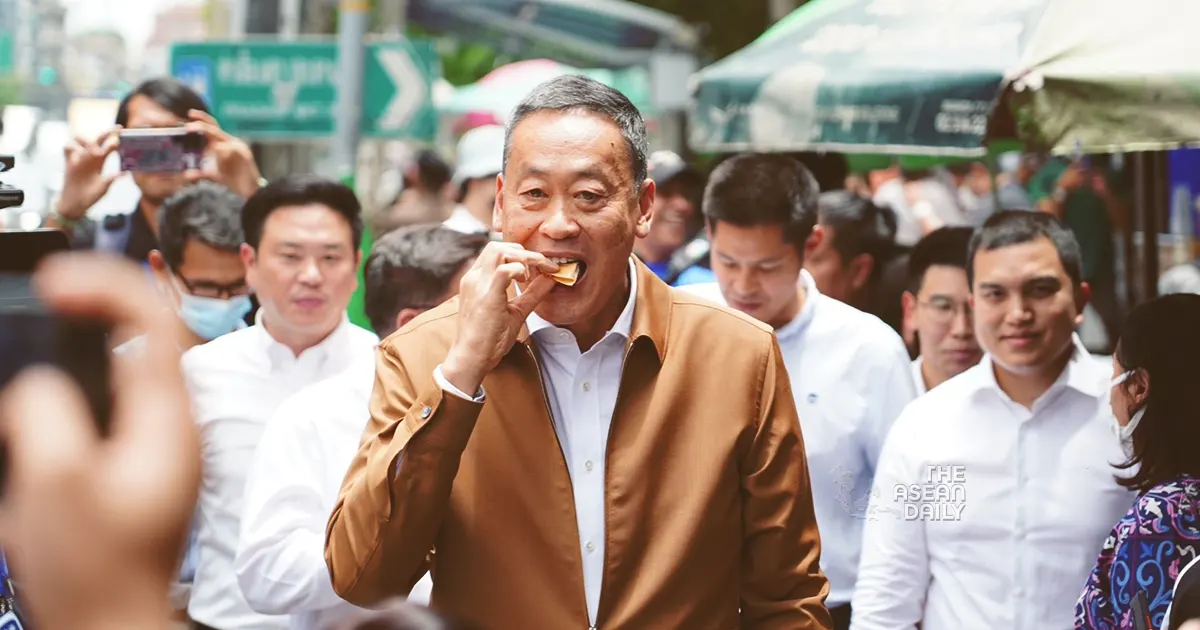20-10-2023 (BANGKOK) Mr Pradit Boonkate, aged 67, has devoted the past 16 years of his life to working as a security guard in the bustling metropolis of Bangkok, far away from his humble origins in the central province of Ratchaburi. His monthly earnings amount to a modest 15,900 baht (equivalent to US$437), accompanied by a mere six days of annual leave.
The initial glimmer of hope that washed over him was when he learned that he would be among the estimated 56 million Thais slated to receive a digital cash handout worth 10,000 baht from the incoming government next February. This economic incentive had been formulated by the ruling Pheu Thai Party as part of their political campaign.
For individuals like Mr Pradit, grappling with limited income, this scheme, which involves the distribution of cash in digital form, appears as a promising prospect on the surface. However, the stipulation that this cash must be spent within a six-month timeframe, solely on essentials such as food, medicines, and occupational tools, within a 4-kilometer radius of one’s registered address, poses a daunting challenge for those who toil far from their hometowns.
Mr. Pradit, whose registered address remains tied to his hometown in Ratchaburi, articulates this predicament, “For people who live in the countryside, there is a huge distance between the town and their homes. Their villages often have small grocery stores selling things like canned fish and eggs, which won’t accept the digital money.”
Even though the government has pledged to amend the terms for remote areas to ensure equitable access to the digital cash, there are apprehensions that this US$15 billion initiative may ultimately favor the affluent and larger businesses, which already possess the technological infrastructure to facilitate transactions. Mr. Pradit adds, “How can small shops supply so many things? It’s good to receive the money, but if you ask who will enjoy the benefit, it’s the rich.”
THE GOVERNMENT GIVES, THE PEOPLE PAY?
The digital wallet program is intended for Thai citizens, with the sole qualifying criterion being that they are aged 16 and above. Its principal objective is to augment the purchasing power of low-income earners while catalyzing economic growth through income redistribution across communities nationwide.
Nonetheless, a consortium of approximately 99 academics, economists, and former governors of the Bank of Thailand have recently issued a collective statement opposing the implementation of this program. They implore the government to abandon the program, reasoning that such a massive expenditure to boost short-term consumption will escalate public debt and jeopardize Thailand’s long-term financial stability.
“Ultimately, it’s the people who will have to pay it back, whether through higher taxes and/or increased prices of goods due to inflation – a consequence of monetary injection,” the statement contends.
Last month, the Governor of the Bank of Thailand, Dr. Sethaput Suthiwartnarueput, also suggested that the policy should be directed exclusively towards specific demographic groups, asserting that not everyone requires such financial assistance, especially given the ongoing economic recovery. Furthermore, some small business owners are hesitant to participate in the program.
Ms. Orapin Thanomsap, who owns a small food and goods store in Bangkok’s Watthana district, voices her uncertainty regarding when she can redeem the digital payments from her customers. She harbors doubts about the scheme generating additional revenue for her shop, as she believes most consumers will spend their cash handouts at malls, convenience stores, and supermarkets.
“It’ll benefit 7-Eleven, not humble shops like mine, I can guarantee,” she remarks, highlighting her intention to spend the digital money at large supermarkets to replenish her store while saving her personal funds. She concludes, “This will give a boost for the rich, for sure; as for the poor, they’ll just continue being poor.”
SPLIT AND DELAY THE DIGITAL PAYMENT
Prime Minister Srettha Thavisin, on Saturday (October 14), defended his party’s policy, while acknowledging the mixed feelings surrounding the “digital wallet” program. He posited that injecting US$15 billion into the economy via digital wallets could stimulate public spending, enhance productivity in the industrial sector, and bolster employment.
He affirmed, “Our intention is that the money is spent in local areas where your address is registered. This will help develop your communities and not just the big cities alone.”
However, despite months of campaigning, Mr. Srettha and his Pheu Thai Party have yet to ascertain the financing for this multibillion-dollar program. According to the Prime Minister’s secretary-general, Mr. Prommin Lertsuridej, there are three potential sources for the funds, including the 2024 fiscal year budget, borrowing from state agencies, and other loans.
Nonetheless, political analysts contend that the national budget is not a viable option, as it will not be available until April of the following year, two months after the proposed program launch.
“The budget plan will be submitted for royal approval on April 17, 2024… as a result, it can only be used afterwards,” explained Assoc Prof Somchai Srisutthiyakorn, director of the Political and Development Research Centre at Rangsit University.
In light of the national budget’s unavailability, he suggests deferring the digital wallet program until May of the next year, when the budget will have already been accessible. Additionally, he proposes splitting the payment into two installments, with the first 5,000-baht payment in May and the remainder in November, in order to alleviate the country’s financial burdens.
However, he acknowledges that such a move may result in a loss of face for the Pheu Thai-led government.

A CAMPAIGN PROMISE AND POLITICAL FUTURE
The digital wallet program was a central campaign promise of the Pheu Thai Party, a pledge they cannot afford to break if they hope to secure victory in the upcoming general election. In May of the current year, the long-standing political group faced an electoral defeat for the first time when they were surpassed by the young and progressive party, Move Forward.
Subsequently, Pheu Thai formed a coalition with the victorious party and opposition groups, but later parted ways to forge an alliance with the previous ruling camp connected to the military and coup makers. This series of controversial maneuvers has sullied Pheu Thai’s political image as a bastion of democracy in Thailand, leading to what analysts describe as “a crisis of faith.”
Assoc Prof Dr. Nantana Nantavaropas, Dean of the Political Communication College at Krirk University, underscores the significance of the 10,000-baht cash handout policy in Pheu Thai’s bid to regain their political dominance. She explains, “This (10,000-baht cash handout) policy is the policy they’ll use to win back the championship. If they succeed, it could make them a champion in the next election.”
While Pheu Thai and its political predecessors are renowned for their populist policies, which traditionally took the form of financial support for farmers and healthcare subsidies, the outright distribution of money to the public is a novel approach. Dr. Nantana characterizes the 10,000-baht digital wallet scheme as “helicopter money,” signifying that it is dispensed without any obligation for repayment.
With substantial expenses and a lack of clarity regarding the program’s implementation and funding sources, analysts warn that Pheu Thai could place Thailand in a precarious position by bestowing free money upon 56 million people. Dr. Nantana emphasizes that while populist policies can benefit the disadvantaged, they should also be designed to foster self-improvement among the recipients and ensure a return on investment in terms of productivity.
Otherwise, she likens it to providing fish to the populace without teaching them how to fish independently.
For low-income individuals like Mr. Pradit, 10,000 baht represents a substantial sum of money. However, the practical challenges involved in spending it require him to take a day off work and embark on a journey of over 100 kilometers to his hometown in Ratchaburi, in the hope of locating stores that will accept his digital wallet.
“I’ll buy something for my relatives there because I won’t be able to carry things back to Bangkok,” he muses.




